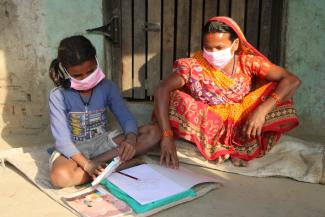“I want to become a Nepali teacher when I grow up,” shares 9-year-old Priti Kumari, a grade 2 student in a community school in Parsa District of Nepal. “Learning is so much fun now with new materials.” Priti is referring to the children’s reading materials, school supplies, and leveled books provided to community schools through USAID’s early grade reading programs. Priti states that she was motivated to start attending school regularly when learning became more fun, noting that she also enjoys joining a learning cluster with her friends after school hours.
Priti is one of the many students who are now catching up on instructional time lost during COVID-19 lockdowns and school closures. They are doing so through the home- and community-based learning approach that USAID’s early grade reading program helped schools set up in some of the most disadvantaged, rural areas of Nepal starting in January 2021.
“Priti used to have trouble focusing on learning and easily became bored. But ever since the extra classes in the cluster began, she has completely changed. She loves reading now, she enjoys drawing, and her grades are improving; as a parent, I am very happy about this positive improvement in her attitude toward learning,” adds Priti’s mother, Anita Devi Paswan.
Despite not having completed any formal education, Anita Devi accompanies her daughter most afternoons to the learning clusters and regularly participates in parent-teacher meetings. “It feels great to see children learning. Studying in a learning cluster during after-school hours has also helped her catch up on all that she missed due to the COVID-19 pandemic. My husband and I never attended formal schooling, but we want to make sure that our daughter gets a good education. She wants to become a Nepali teacher in the future. As parents, we’ll support her in fulfilling her dreams. Though I myself can’t read many of the books she brings home, I sit next to her to make sure she knows her parents appreciate her learning journey as much as she does.”
Shambhu Shah, Local Education Unit Chief in a neighboring rural municipality, shared his viewpoint, “USAID’s early grade reading program has truly changed the perspective of parents toward participation in their children’s education. Parents now routinely spend time with their children while they read and write at home. Parent interest and engagement has contributed to improving the learning of students.” Anita and Priti’s family is one of thousands that have enjoyed similar positive experiences with the after-school learning opportunities that USAID’s early grade reading program has supported in 487 schools across 32 municipalities in Province 2. This community- and home-based schooling approach is increasing parental engagement and helping children “catch up” on learning lost due to COVID-19—and it is even inspiring Priti to become a teacher herself.

